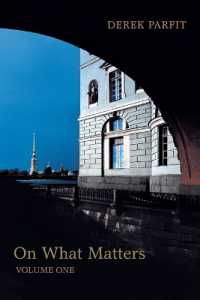Full Description
The product of an 18 month empirical study which examined the use of restorative justice for hate crime in the United Kingdom, this book draws together theory and practice in order to examine the causes and consequences of hate crime victimisation. Hate Crime and Restorative Justice: Exploring Causes, Repairing Harms also identifies the key process variables within restorative practice that can help to repair the harms of hatred. In doing so, it challenges commonly held conceptions of both 'hate crime' and 'restorative justice' through its use of qualitative research of restorative interventions across the UK.
The study's findings provide original data on the contextual variables that are intrinsic to both the cause and effect of hate-motivated offences, revealing complex socio-cultural and socio-economic factors that are fundamental, both to our understanding of hate crime and to how such incidents can be best resolved. Through meticulous analysis and discussion, the book also provides new information on how restorative processes can be used to repair the harms of hate and challenge the prejudices which give rise to hate-motivated conflicts. The issue of group identity and cultural 'difference' amongst participants of restorative justice is explored and examined through the use of detailed case studies, allowing assessment of whether dialogical barriers to reconciliation can limit the success of restorative processes. In particular, the notion of 'community', a fundamental concept of restorative justice theory and practice, is reconceptualised by exploring both its healing and harming features.
Utilising data from the first study of its kind, Hate Crime and Restorative Justice draws together theoretical assumptions about restorative philosophy and empirical evidence of its use for hate crime to offer a more holistic understanding of how restorative justice can help repair the harms caused by processes of hate, while simultaneously challenging the identity-based prejudices that continue to pervade our multicultural communities.
Contents
1. Conceptualising hate Crime for restorative justice ; 2. Conceptualising restorative justice for hate crime ; 3. The harms of hate crime: from structural disadvantage to individual identity ; 4. Repairing the harms of everyday hate crime: exploring community mediation and the views of restorative practitioners ; 5. Restorative policing and hate crime ; 6. Secondary victimisation, state participation and the importance of multi-agency partnerships ; 7. The perils of 'community' in restorative justice: from theory to practice ; 8. Humanising 'difference' and challenging prejudice through restorative dialogue ; Conclusion: Uncovering hidden truths







